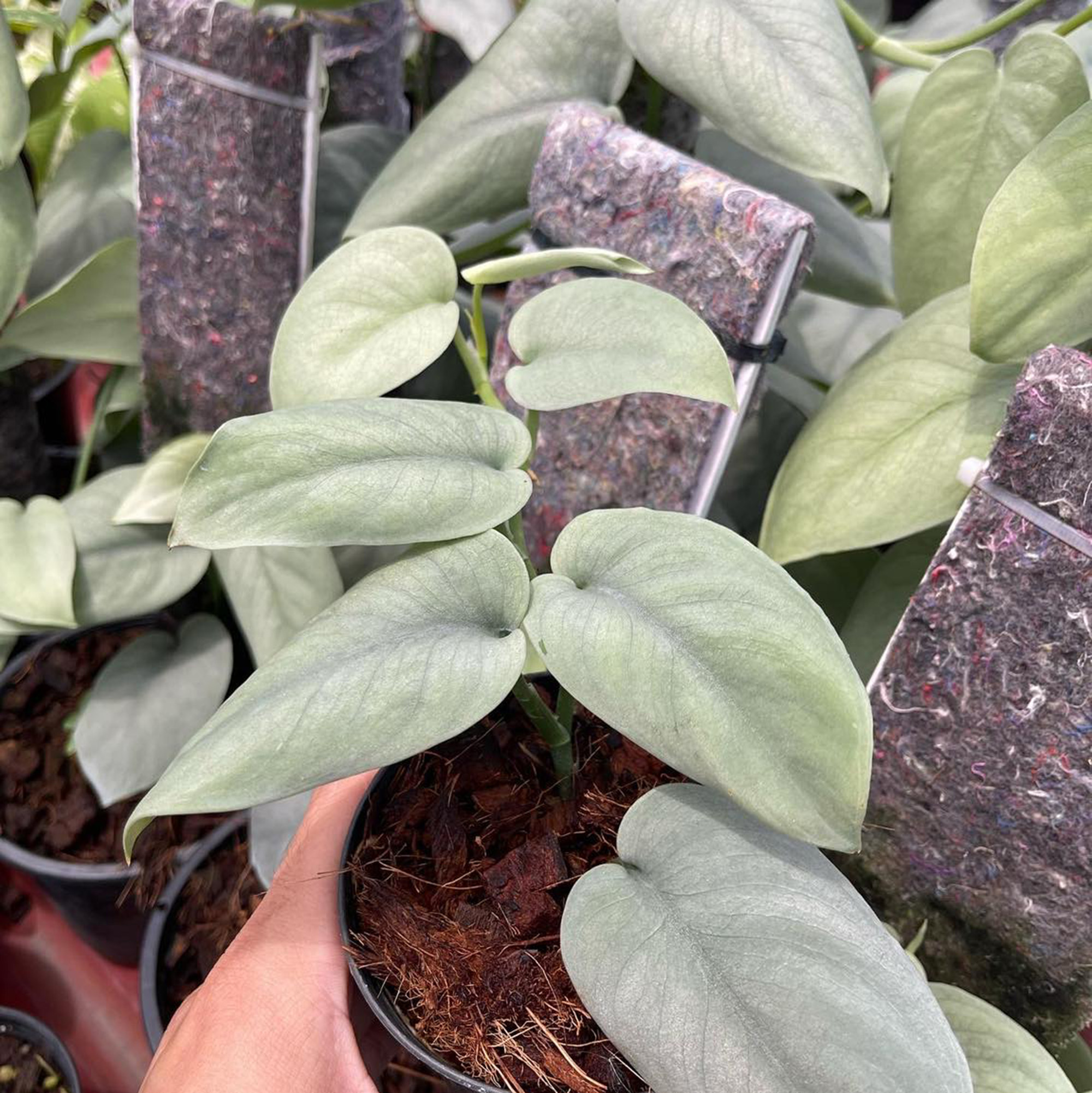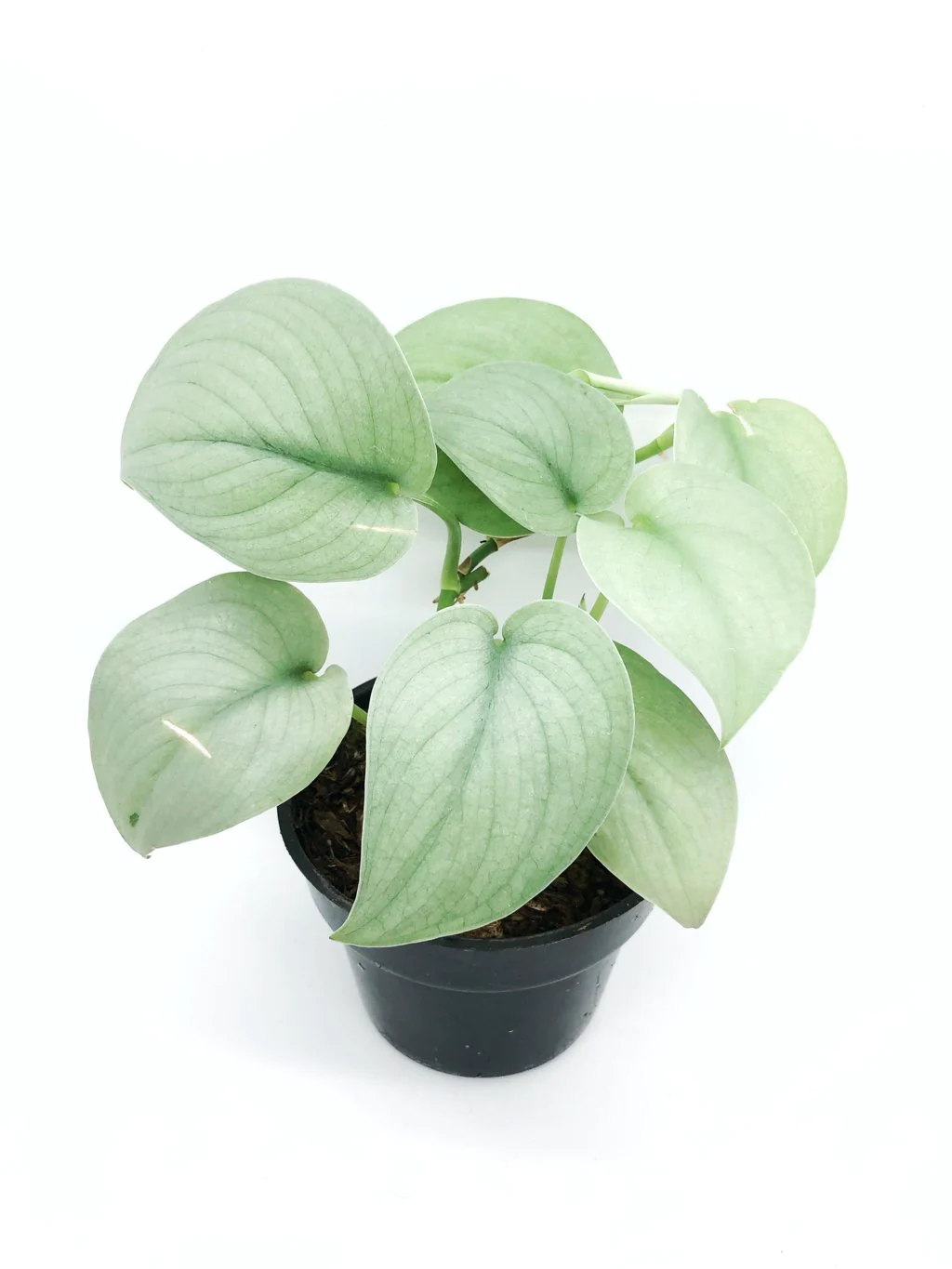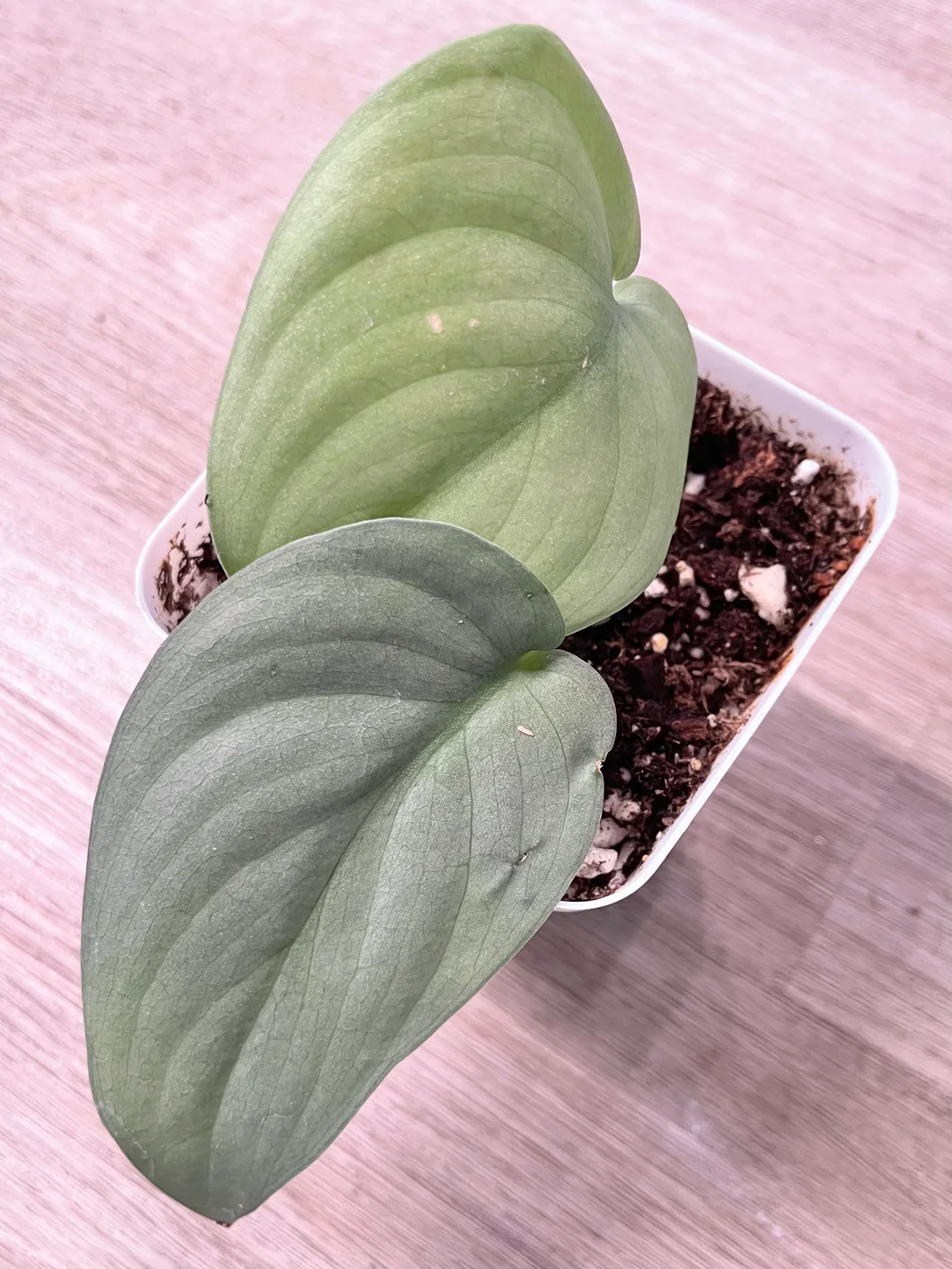5 Fascinating Facts About Scindapsus Platinum
Scindapsus platinum is a gorgeous houseplant known for its silvery green foliage. As a variety of pothos, it is easy to care for and makes a stunning addition to any indoor space. Here are 5 fascinating facts about this eye-catching vine.

What Gives Scindapsus Platinum Its Color
The leaves of scindapsus platinum have a distinct silvery sheen covering their green surface. This is caused by a waxy substance on the foliage that refracts light, creating a shimmery silver tone over the underlying green chlorophyll. The coloring can range from subtle to quite dramatic depending on how the light hits the leaves.
The Coloring Can Intensify with Age
Many scindapsus platinum plants start out with more subtle silvery tones when they're younger. As the plants mature over time, the coloring often intensifies and becomes more prominently silver across the leaves. More established plants tend to have foliage with a high-impact metallic tone compared to younger specimens.
For more on how different environmental factors can impact the color and health of your Scindapsus, consider reading 'Scindapsus 101: A Beginner's Guide to Understanding and Growing'.
Scindapsus Use Aerial Roots to Climb
In their native tropical habitats, scindapsus platinum vines use aerial roots growing from their stems to cling and climb up the bark of trees. The roots act like suction cups or hooks to adhere the vine as it grows upwards. As houseplants, they can be grown on poles, trellises, or allowed to trail from hanging pots.
Pruning Encourages Fuller Growth
If scindapsus platinum houseplants get too leggy from climbing or trailing, they can be trimmed back. Cutting the stems back encourages the plant to produce side shoots and more aerial roots, creating a fuller, bushier appearance over time with regular pruning. This helps the vines look more lush.
For an in-depth understanding of their growth habits and how to replicate these conditions at home, check out 'How to Grow Scindapsus in 5 Easy Steps'.

"Unleash the beauty of nature in your home with the Scindapsus platinum! Click here to add this stunning plant to your collection today!"
Scindapsus Removes Harmful Pollutants
Like many other houseplants, scindapsus platinum helps filter indoor air by absorbing pollutants. Its leaves and root system are able to remove harmful volatile organic compounds (VOCs) such as formaldehyde, xylene, and toluene from the surrounding environment.
Its Air Purifying Effects Are Strongest at Night
Scindapsus performs the majority of its air cleansing at night. When photosynthesis stops in the dark, the plant shifts to absorbing and filtering air pollutants instead. Positioning the plant in a bedroom offers the maximum air purifying benefits while you sleep.
To learn more about the benefits of having Scindapsus in your home, especially for air purification, read 'Are you growing scindapsus at home? Find out its 5 secret advantages!'.
Scindapsus Platinum Needs Little Care to Thrive
One of the appeals of scindapsus platinum is that it's a very easy going and low maintenance houseplant. It adapts readily to indoor environments and doesn't require much specialized care. As long as its basic needs are met, the vine tends to grow well with minimal effort.
It Tolerates a Wide Range of Light Levels
Scindapsus platinum is flexible when it comes to its light preferences, tolerating low to bright indirect light. It handles lower light better than many houseplants, making it suitable for darker corners or rooms with limited sunlight. But brighter light brings out the most intense silver coloring in the leaves.

Ingesting Parts of the Plant Causes Illness
While scindapsus platinum makes an eye-catching addition to homes, it can pose a danger to pets. All parts of the plant contain insoluble calcium oxalates - crystals that are highly toxic if ingested. Pets that chew on the foliage or stems can suffer painful swelling, vomiting, and other harmful symptoms.
Keep It Out of Reach of Cats and Dogs
To keep curious pets safe, scindapsus platinum should be displayed completely out of reach. Place it on high shelves or plant stands that prevent access. Since pothos tends to trail as it grows, be sure even hanging vines remain fully out of contact from pets below. Monitoring for fallen leaves is also wise.
With its gorgeous silver-green leaves, natural vining habit, and air purifying abilities, scindapsus platinum makes a stunning yet practical houseplant. As long as you keep it safely away from pets, it's a relatively easy-going variety that adds wonderful visual interest without needing much specialized care. Let its metallic tones shine in your home's
- What is Scindapsus Platinum?
- Scindapsus Platinum is a variety of the Scindapsus plant, known for its unique, silver or platinum-colored leaves. It's a popular houseplant due to its striking appearance and ease of care.
- How do I care for my Scindapsus Platinum?
- To care for your Scindapsus Platinum, place it in indirect light, water it when the top inch of soil feels dry, and maintain a consistent temperature and humidity. Avoid overwatering and ensure good drainage to prevent root rot.
- Can Scindapsus Platinum thrive in low light?
- While Scindapsus Platinum prefers bright, indirect light, it can tolerate lower light conditions. However, its growth may be slower, and the variegation of its leaves might become less pronounced in less light.
- Is Scindapsus Platinum toxic to pets?
- Yes, Scindapsus Platinum, like other Scindapsus species, is toxic to cats and dogs if ingested. It's best to keep the plant out of reach of pets to avoid any potential health issues.
- How often should I repot Scindapsus Platinum?
- Scindapsus Platinum should be repotted every 1-2 years or when it outgrows its current pot. Choose a pot that is slightly larger than the current one and use well-draining potting soil to encourage healthy growth.
https://greenboog.com/fascinating-facts-about-scindapsus-platinum/

Fact 1: Its Leaves Have a Unique Color
What Gives Scindapsus Platinum Its Color
The leaves of scindapsus platinum have a distinct silvery sheen covering their green surface. This is caused by a waxy substance on the foliage that refracts light, creating a shimmery silver tone over the underlying green chlorophyll. The coloring can range from subtle to quite dramatic depending on how the light hits the leaves.
The Coloring Can Intensify with Age
Many scindapsus platinum plants start out with more subtle silvery tones when they're younger. As the plants mature over time, the coloring often intensifies and becomes more prominently silver across the leaves. More established plants tend to have foliage with a high-impact metallic tone compared to younger specimens.
For more on how different environmental factors can impact the color and health of your Scindapsus, consider reading 'Scindapsus 101: A Beginner's Guide to Understanding and Growing'.
Fact 2: It's a Natural Climbing Vine
Scindapsus Use Aerial Roots to Climb
In their native tropical habitats, scindapsus platinum vines use aerial roots growing from their stems to cling and climb up the bark of trees. The roots act like suction cups or hooks to adhere the vine as it grows upwards. As houseplants, they can be grown on poles, trellises, or allowed to trail from hanging pots.
Pruning Encourages Fuller Growth
If scindapsus platinum houseplants get too leggy from climbing or trailing, they can be trimmed back. Cutting the stems back encourages the plant to produce side shoots and more aerial roots, creating a fuller, bushier appearance over time with regular pruning. This helps the vines look more lush.
For an in-depth understanding of their growth habits and how to replicate these conditions at home, check out 'How to Grow Scindapsus in 5 Easy Steps'.

"Unleash the beauty of nature in your home with the Scindapsus platinum! Click here to add this stunning plant to your collection today!"
Fact 3: It Purifies Indoor Air
Scindapsus Removes Harmful Pollutants
Like many other houseplants, scindapsus platinum helps filter indoor air by absorbing pollutants. Its leaves and root system are able to remove harmful volatile organic compounds (VOCs) such as formaldehyde, xylene, and toluene from the surrounding environment.
Its Air Purifying Effects Are Strongest at Night
Scindapsus performs the majority of its air cleansing at night. When photosynthesis stops in the dark, the plant shifts to absorbing and filtering air pollutants instead. Positioning the plant in a bedroom offers the maximum air purifying benefits while you sleep.
To learn more about the benefits of having Scindapsus in your home, especially for air purification, read 'Are you growing scindapsus at home? Find out its 5 secret advantages!'.
Fact 4: It's Very Low Maintenance
Scindapsus Platinum Needs Little Care to Thrive
One of the appeals of scindapsus platinum is that it's a very easy going and low maintenance houseplant. It adapts readily to indoor environments and doesn't require much specialized care. As long as its basic needs are met, the vine tends to grow well with minimal effort.
It Tolerates a Wide Range of Light Levels
Scindapsus platinum is flexible when it comes to its light preferences, tolerating low to bright indirect light. It handles lower light better than many houseplants, making it suitable for darker corners or rooms with limited sunlight. But brighter light brings out the most intense silver coloring in the leaves.

Fact 5: It's Toxic to Pets
Ingesting Parts of the Plant Causes Illness
While scindapsus platinum makes an eye-catching addition to homes, it can pose a danger to pets. All parts of the plant contain insoluble calcium oxalates - crystals that are highly toxic if ingested. Pets that chew on the foliage or stems can suffer painful swelling, vomiting, and other harmful symptoms.
Keep It Out of Reach of Cats and Dogs
To keep curious pets safe, scindapsus platinum should be displayed completely out of reach. Place it on high shelves or plant stands that prevent access. Since pothos tends to trail as it grows, be sure even hanging vines remain fully out of contact from pets below. Monitoring for fallen leaves is also wise.
Conclusion
With its gorgeous silver-green leaves, natural vining habit, and air purifying abilities, scindapsus platinum makes a stunning yet practical houseplant. As long as you keep it safely away from pets, it's a relatively easy-going variety that adds wonderful visual interest without needing much specialized care. Let its metallic tones shine in your home's
- What is Scindapsus Platinum?
- Scindapsus Platinum is a variety of the Scindapsus plant, known for its unique, silver or platinum-colored leaves. It's a popular houseplant due to its striking appearance and ease of care.
- How do I care for my Scindapsus Platinum?
- To care for your Scindapsus Platinum, place it in indirect light, water it when the top inch of soil feels dry, and maintain a consistent temperature and humidity. Avoid overwatering and ensure good drainage to prevent root rot.
- Can Scindapsus Platinum thrive in low light?
- While Scindapsus Platinum prefers bright, indirect light, it can tolerate lower light conditions. However, its growth may be slower, and the variegation of its leaves might become less pronounced in less light.
- Is Scindapsus Platinum toxic to pets?
- Yes, Scindapsus Platinum, like other Scindapsus species, is toxic to cats and dogs if ingested. It's best to keep the plant out of reach of pets to avoid any potential health issues.
- How often should I repot Scindapsus Platinum?
- Scindapsus Platinum should be repotted every 1-2 years or when it outgrows its current pot. Choose a pot that is slightly larger than the current one and use well-draining potting soil to encourage healthy growth.
https://greenboog.com/fascinating-facts-about-scindapsus-platinum/
Nhận xét
Đăng nhận xét